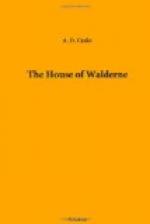The pages separated in great excitement. Most of them held with Hubert—for Drogo’s arrogant manners had not gained him many friends. Much advice was given to the younger boy how to “go in and win,” and the poor lad was eager for the fight whereby his honour was to be vindicated, as though victory and reputation were quite secured, as indeed in his belief they were.
The ordeal! it seems full of superstition to us, unaccustomed to believe in, or to realise, God’s direct dealing with the world. But men then thought that God must show the innocence of the accused who thus appealed to Him, whether by battle or by the earlier forms of ordeal {18}.
But was not the casting of lots in the Old Testament akin to the idea, and are there not passages in the Levitical books prescribing similar usages with the object of detecting innocence or guilt?
At all events, the ordeal was allowed to be decisive, and if it were a capital charge, the headsman was at hand to behead the convicted offender—convicted by the test to which he had appealed.
A peculiarly solemn order and ritual was observed in such appeals, when the fight was to the death. The combatants confessed, and received, what to one was probably his last Communion; and thus avowing in the most solemn way their innocence before God and man, they came to the lists. In cases where one of the party must of necessity be perjured, the sin of thus profaning the Sacraments of the Church was supposed to ensure his downfall the more certainly, for would not God the rather be moved to avenge Himself?
But in the case of these pages, both under the degree of knighthood, such solemn sanction was not invoked, yet the affair was sufficiently impressive. The tilt yard was a wide and level sward, bordered on one side by the moat, surrounded by a low hedge, within which was erected a covered pavilion, not much unlike the stands on race courses in general design, only glittering with cloth of gold or silver, with flags and pennons fair.
In the foremost rank of seats sat the earl and his countess, with other guests of rank then residing in the castle, behind were other privileged members of the household, and around the course were grouped such of the retainers and garrison of the castle as the piquant passage of arms between two boys had enticed from their ordinary posts or duties. But perhaps it was only the same general appetite for excitement which gathers the whole mass of boys in our public schools (or did gather in rougher days), to witness a “mill.”
But one essential ceremonial was not omitted. The two combatants being admitted to the lists, each stood in turn before the earl, seated in the pavilion, and thus cried:
“Here stands Drogo of Harengod, who maintains that he saw Hubert (of Nowhere) shoot the earl’s deer, and will maintain the same on the body of the said Hubert, soi-disant of Walderne.”
These additions to Hubert’s name were insults, and made the earl frown, while it spoke volumes as to the true cause of the animosity. Then Hubert stood up and spoke.




